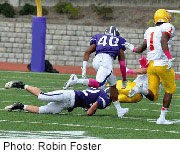
MONDAY, Dec. 8, 2014 (HealthDay News) — A hard hit to the chest during a football game resulted in three days of an irregular heart rhythm for a 16-year-old player, researchers report in a new case study.
The paper, published online Dec. 8 in the journal Pediatrics, describes the first known report of atrial fibrillation in a teenager following blunt force trauma to the chest. The boy was apparently healthy and had no medical history of a heart condition.
“Atrial fibrillation occurs when the upper chambers, or atria, of the heart begin beating erratically,” explained Dr. Sarah Samaan, a cardiologist at Legacy Heart Center in Plano, Texas, who was not involved in the study. “Because the atria are essentially shaking and not squeezing, blood may pool in the small crevices of the atria, and after 24 to 48 hours, there is a risk of a blood clot forming.”
If a clot does form and then leaves the heart, it could enter the brain and cause a stroke. But this is very unlikely for the vast majority of teenagers, said Dr. Gregg Fonarow, a cardiology professor at the David Geffen School of Medicine of University of California, Los Angeles.
“The development of atrial fibrillation after trauma to the chest is very rare,” Fonarow said. “As this is so rare, this should not be something that parents and their children should be concerned with.”
Senior study author Dr. Andras Bratincsak, a pediatric cardiologist, said it’s still worth being aware that young athletes’ hearts should be checked after a chest trauma.
“It is obviously underreported, but we do not know the true incidence,” said Bratincsak, a professor at the John A. Burns School of Medicine at the University of Hawaii, in Honolulu. He said it could be similar to another condition called commotio cordis, which results from ventricular fibrillation — a more serious erratic rhythm in the heart’s lower chambers — following a hard hit to the chest.
Ventricular fibrillation can cause the heart to stop, and usually results in sudden death, but it is also very rare. Only 216 such incidents have ever been reported, according to a 2013 study, and 156 of those individuals died.
Fonarow said it’s worth considering having an automatic defibrillator and CPR-trained coaches at organized sporting events for children.
“No screening is needed,” Fonarow said, “but taking reasonable steps to avoid blunt chest trauma is advisable.”
Symptoms that might accompany any kind of irregular heart rhythm include dizziness, lightheadedness, shortness of breath and occasionally loss of consciousness, Samaan said.
The patient in this study did not experience any of those symptoms but did report to the emergency room because of chest pain and the heart palpitations he felt. His chest X-ray was normal, but he was admitted to the hospital for observation.
Three days later, his heart rate returned to normal on its own, and his heart remained healthy and normal one year later.
“There is no way to know how often this may occur,” Samaan said. “It’s very likely that the rhythm problem resolves quickly without treatment in many young, healthy individuals. In that case, it is not likely to ever be diagnosed.”
While these events are very rare, Samaan said, it’s important to recognize their symptoms because they can be deadly.
“Symptoms of dizziness, unusual shortness of breath or a rapid heart rate should prompt a medical evaluation, especially if these symptoms occur after trauma to the chest,” Samaan said. “It’s especially important that coaches and others involved in sports activities be aware of the possible implications of trauma to the chest.”
The study required no outside funding, and the authors reported no conflicts of interest.
More information
Visit the Cleveland Clinic for more on atrial fibrillation.
Copyright © 2026 HealthDay. All rights reserved.

